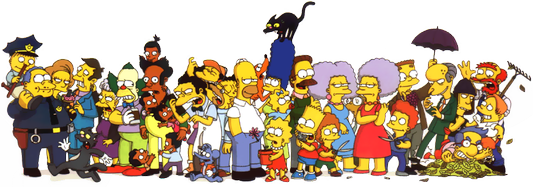My husband recently developed an interest in the long-standing cartoon show, The Simpsons . I have enjoyed watching in the past, and marveling at how the writers can create clever, engaging humor year after year. As someone with an expertise in the psychology of humor, I am also amazed at how, even when the jokes seem to be about superficial foibles and character flaws (Homer is dumb and fat, Lisa is vain, Nelson is a bully, Chief Wiggum is a corrupt and lazy cop), the humor often has a deeper element.
While it's perfectly fine to just enjoy the humor at the superficial level, if you think about why it's funny that Homer is dumb, or why it's funny that Nelson is a bully, you realize that humor is very often a sneaky way to engage with cultural and moral issues that would meet with resistance if they were discussed in a more serious way.
In the psychology of humor, researchers have coined the term "the comedic frame" to explain this phenomenon. When an audience—whether it be at a standup comedy show, or on your couch, watching television—understands that what they are observing is supposed to be funny, the characters (and standup comedians are indeed characters) are given license to break rules, breach taboos, and speak about topics which are normally not allowed in polite conversation.
Imagine going to a lecture and listening to a speaker talk to you about why you shouldn't use corporal punishment on your children. I've come to learn just how difficult it is to convince some parents—especially ones who experienced corporal punishment when they were children—that spanking, shaming, and guilt-induction are ineffective as parenting tools, and breed resentment in the minds of children. Nobody wants to be lectured.
Now, take a look at this youtube video of Homer Simpson strangling his son when his son misbehaves. How might the psychology of humor explain why this is funny? If you ever went to someone's house, and a child misbehaved, and in turn, the father of that child began to strangle his son, you wouldn't laugh! You'd be horrified. You might feel it was your duty to call Child Protective Services. And yet, when Homer does it, we are not judgmental or horrified. Instead, we accept that the strangling behavior is not real, but is meant to be funny.
The psychology of humor has been attempting to argue that comedy serves as a vehicle for delivering ethical messages, and that the comedic frame is one reason that those ethical messages can be received with less resistance than if they were delivered in another format.
There are several ways that comedy can accomplish this task of teaching/suggesting which actions or speech are appropriate and acceptable, and which are not. The primary one, in my opinion, can be explained by the superiority theory. According to the philosopher Thomas Hobbes, many instances of humor involve a character being presented in a way that most people would look down upon. Sometimes, the character is presented as a fool, other times the character is presented as morally degenerate, and other times, the character is a morally degenerate fool.
When we encounter a person or character who is presented in one of these ways, we are given permission (especially if there is a comedic frame involved) to feel superior to that person or character. Often, this feeling of superiority is expressed through laughter. Thomas Hobbes stated it this way:
"Sudden Glory is the passion which maketh those Grimaces called laughter; and it is caused either by some sudden act of their own that pleaseth them; or by the apprehension of some deformed thing in another, by comparison whereof they suddenly applaud themselves."
Homer Simpson is a degenerate fool, who, though lovable, represents our vices, weaknesses and anxieties. Homer Simpson acts not just as an object of ridicule, but also as an exemplar for how not to act. When Homer Simpson eats too much, or drinks too much, or neglects his children, or ignores his wife, sleeps at his job, or strangles his children, he hyperbolically shows us the wrong way to live. We laugh at him, sure. We may even like him at some level. But we don't want to be him.
The fool, the degenerate, serves a purpose in society. When these characters break or challenge the rules (whether legal or cultural), this vicarious experience may (according to Freudian theory) provide us with an emotional release of pent-up tension which we feel when our urges to rebel against those rules are left unsatisfied. But in the end, the rules still stand. Homer Simpson doesn't inspire us to model our lives after him. If anything, he lets us know that acting like him is foolish and morally vacuous. That's a message that we can receive, and we may be more open to receiving it through comedy than any other means. We laugh, but we also (sometimes) recognize in the exaggeration our own flaws, our own temptations, and we are inspired to strive for something higher.
Homer Simpson! An anti-hero, who is, ironically, also a hero!

